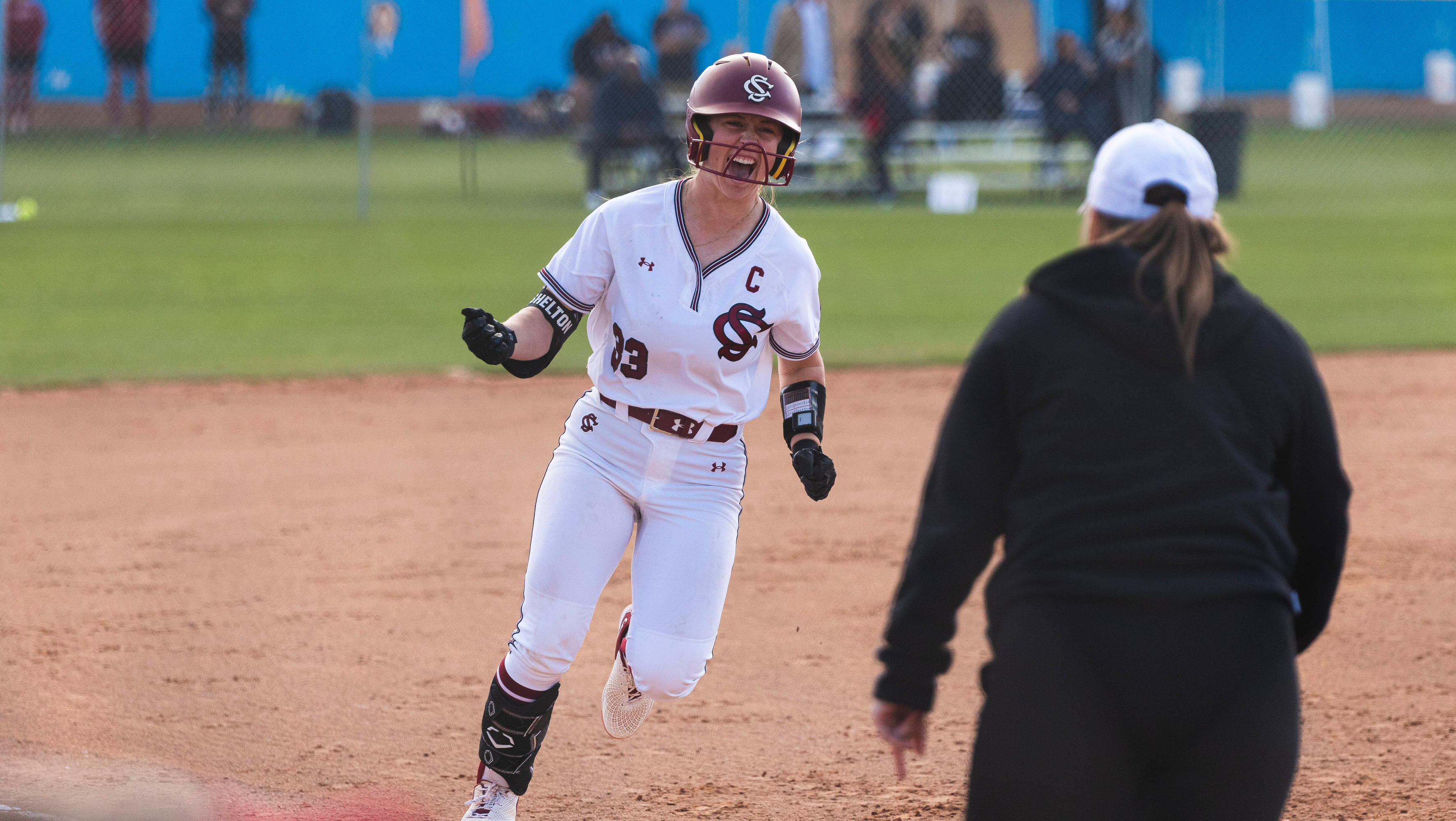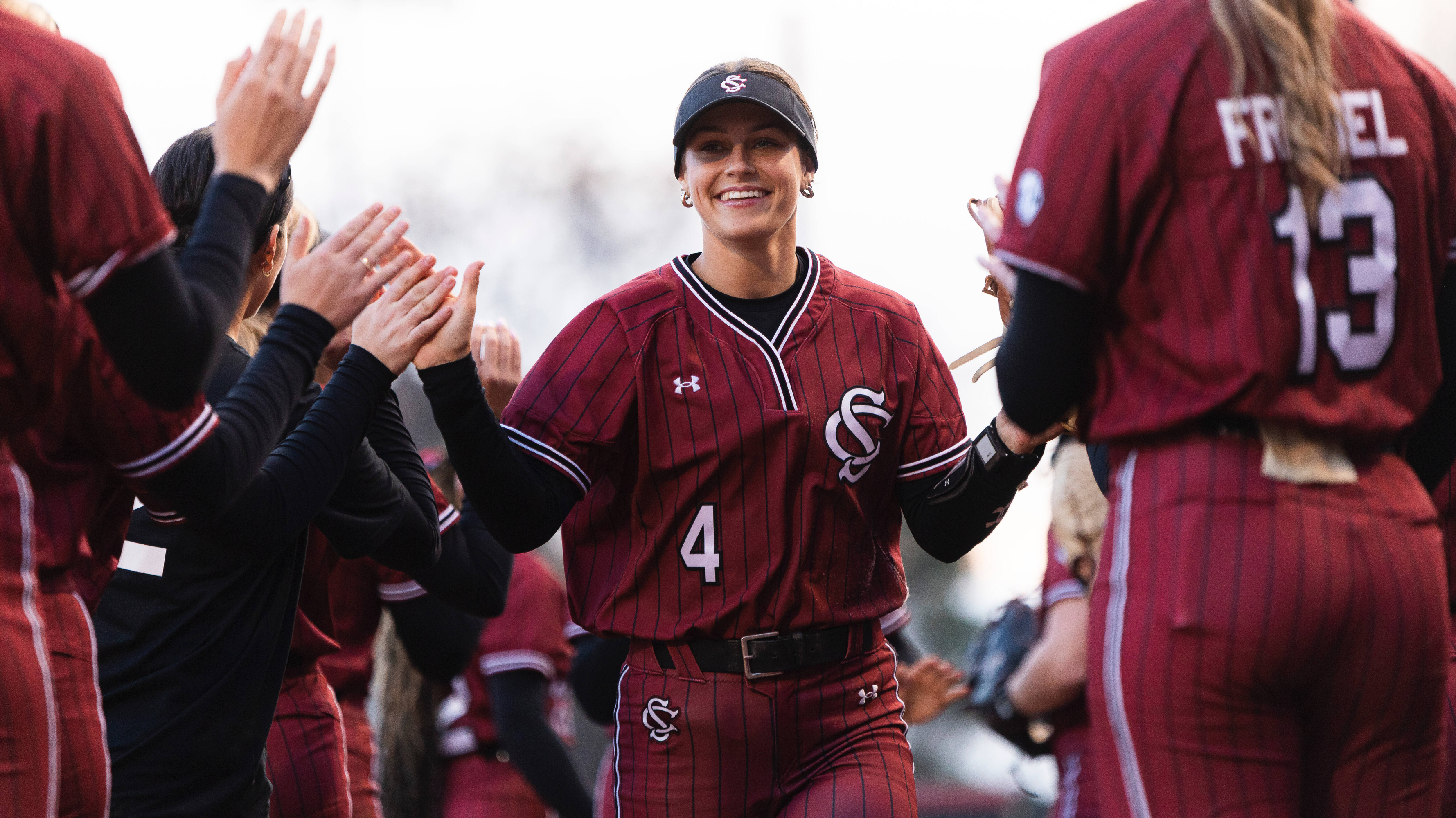March 2, 2017

Trinity Johnson (1995-97) didn’t give opposing hitters too many chances, but if her team gave her a run while she was in the circle, there was a good chance of success for the Gamecocks. As South Carolina softball celebrates the 20th anniversary of the 1997 Gamecocks team that won the inaugural SEC Regular Season and Tournament Championship on the way to a Women’s College World Series appearance, the former All-American pitcher noted that it’s the moments with her teammates that first come to mind, even though she put up some amazing numbers that will be tough for anyone to ever duplicate.

“My best memory of that season was probably the regional win at home,” Johnson said of South Carolina shutting out UNC Greensboro and then Kansas twice with identical one-hit, 1-0 victories to advance to the Women’s College World Series. “I think there were 2,500 or 3,000 people there. It was a big deal. It was on our home field. It was just great.”
Johnson was a senior pitcher on the ’97 team. She won the Honda Award for Softball, which honored the nation’s top player, and was a unanimous selection as the SEC Player of the Year. She led the nation with a 0.38 earned run average and 399 strikeouts, while posting a 34-4 record with 4 saves. What’s more impressive is that she did not allow an earned run in conference play that year.
“My ERA my senior year, it was zero (in SEC games),” Johnson said. “There were some big awards that were a big deal. Winning the Honda Award was a huge deal. It’s like winning the Heisman for my sport.”
“She threw the ball hard,” said former South Carolina head coach Joyce Compton. “She had a great rise ball, but her senior year she finally bought into the change up. That really made a difference in her going from a very good pitcher to a great pitcher her senior year. That made a world of difference in some games and key situations.”
Johnson had unbelievable command, issuing only 23 walks in 241.1 innings that season, while opponents hit only .103 against her. She tossed 6 complete game no-hitters, including 3 perfect games that year, while tallying 156 strikeouts in league play. Johnson was inducted into the University of South Carolina Association of Lettermen’s Athletics Hall of Fame in 2004. Even with the gaudy numbers, Johnson is quick to point out that she wasn’t the only reason for the Gamecocks’ success.
“There was always somebody doing something big,” Johnson said. “The team was so strong that in any given game, someone did something fantastic. Whether it was Kim Pietro making some unbelievable catch out in center field or whomever was behind the plate that game, not allowing a passed ball. There was something that kept us from getting scored on. There wasn’t just one person. That’s what was so great about that team. It was always a complete team effort.”
I remember the end where everyone stampeded in a pile on the mound. I remember ducking out of that and going to congratulate Coach.
Trinity Johnson
Originally from Orange County, Calif., with her parents later moving to Memphis, Johnson was excited to come play in the SEC even though the league did not begin sponsoring softball as a championship sport until her senior year.
“Carrie Dever Boaz was an assistant coach there at the time, and we had known her family for years, so it worked out,” Johnson said. “What was really great about that team was that we had fans who followed us everywhere we went. It really helped knit us together as a team. It wasn’t just family who followed us.”

The 41 year old mother of two and a half year old twins (Alberta and Shepard) currently lives in Germantown, Tenn., where she is a sonographer, performing diagnostic ultrasounds, and also consults for a health and wellness company. Johnson was one of three pitchers for the Gamecocks on the ’97 team, all of whom had impressive numbers and remarkably owned ERA’s under 1.00. Although she had more appearances than the other two combined, she didn’t feel like it was always up to her.
“I did feel a little bit of pressure as the season went on, but the team was so strong, so it wasn’t a huge amount of pressure,” Johnson said. “It was more personal pressure than anything else. I’m really hard on myself. I expected a lot out of myself.”
Johnson’s mentality when she took the circle was simply to dominate.
“I set goals for myself every time I went out there,” Johnson said. “I wanted to strikeout at least 10 every game. I wanted to have a no-hitter every game. That’s just how I tried to play.”
For her career, Johnson did average more than 10 ‘K’s’ per game while fanning at least 10 batters 55 times. In her three years pitching for South Carolina, she tossed nine no-hitters and added 18 one-hitters. A rise ball pitcher, Johnson could mix in a curveball as well.
“I don’t think I threw a fastball one time in my whole college career,” Johnson chuckled.
South Carolina amassed a NCAA-record 38-game win streak during the ’97 season while winning a school-record 63 games overall.
“That was unbelievable,” Johnson said of the streak. “I remember losing the winning streak, and then finishing the rest of the (regular season) without losing again. It was devastating, but at the same time, it took some of the pressure off to keep the winning streak going. It re-lit the fire for us to keep coming back and showed us that we were not invincible.”
Johnson earned the wins in both games against Kansas to win the NCAA regional and earn a berth in the Women’s College World Series, igniting what would be her favorite memory.
“I remember the end where everyone stampeded in a pile on the mound,” Johnson said. “I remember ducking out of that and going to congratulate Coach (Joyce Compton). We had our moments. I mean, I was a college student. So I messed up sometimes. We had a good relationship. There was a mutual respect there.”
As she looks back, Johnson appreciates the significance of being the part of the first SEC Championship team.
“It was huge because nobody else can say that, forever,” Johnson said. “It was a big deal to be able to take that. It’s still such an honor.”
The game of softball has changed in the 20 years since, and such dominant performances in the circle are less common. Johnson played for the U.S. National Team for a couple of years after graduation, and also played professionally for one year before shoulder surgery ended her playing career. She admits that once her playing days were over, she no longer kept up with the game.
“I don’t watch softball anymore,” Johnson said. “I have my own demons around my career, how it ended, and where I wanted it to be. I just loved to play. There was a little bit of politics with Team USA, and I didn’t go out playing to the best of my ability because my body started breaking down a bit. So I started dealing with some depression and anxiety issues at the end of college, and it came to a head, so it was time for me to stop when I did.”
She regrets that another commitment will keep her from returning to Columbia for the 20th anniversary celebration, but she is thankful for the memories.
“Carolina was awesome,” Johnson said. “It was so supportive. It allowed us to not only flourish in our sport, but also learn so much and become better people. I think we’re all doing well in what we do, and I think that’s, in-part, because of the school and the environment it created for us.”












